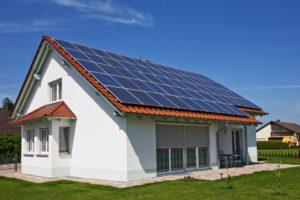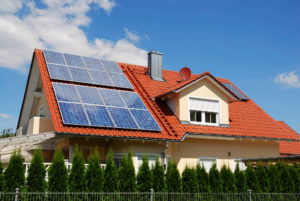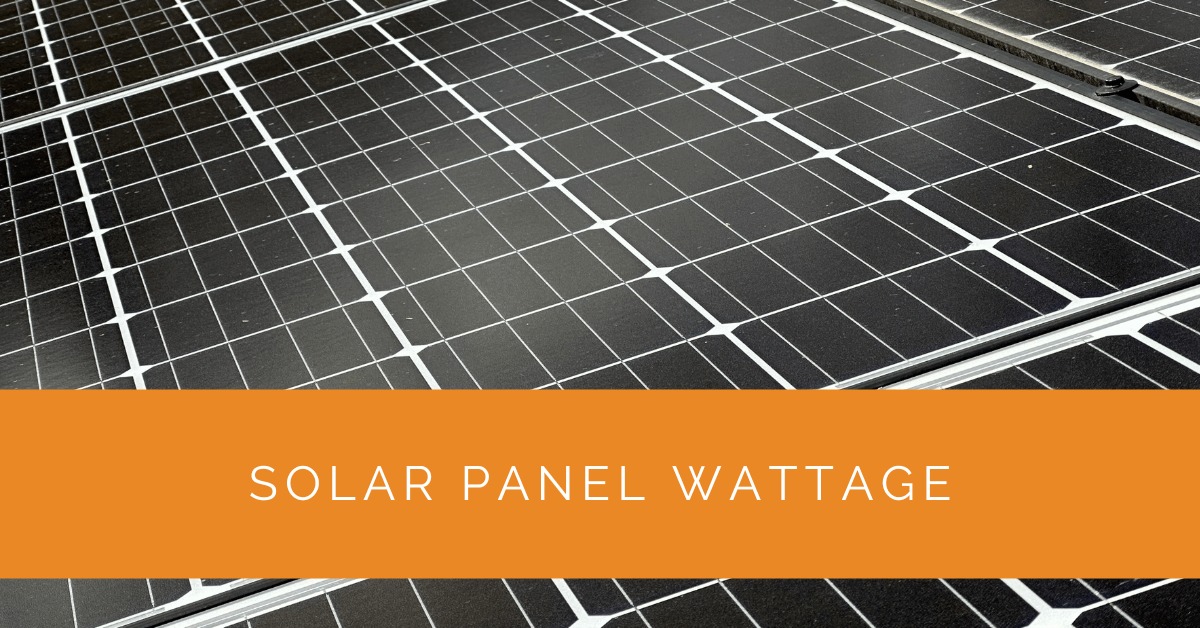Solar power has become increasingly popular for individuals and businesses seeking clean, renewable energy sources. When considering a solar system, understanding the concept of solar panel wattage is crucial. This comprehensive guide will delve into the intricacies of solar panel wattage, its impact on energy production, and how to choose the right wattage for your specific needs.
Contents
- 1 Key Takeaways
- 2 Understanding Solar Panel Wattage
- 3 Calculating Solar Panel Wattage Requirements
- 4 Choosing the Right Solar Panel Wattage
- 5 Optimizing Solar Panel Wattage for Maximum Efficiency
- 6 Case Study: Maximizing Energy Efficiency with Optimal Solar Panel Wattage
- 7 Expert Insights From Our Solar Panel Installers About Solar Panel Wattage
- 8 Experience Solar Excellence with Us!
- 9 Conclusion
- 10 FAQ
Key Takeaways
- Understanding solar panel wattage is crucial for designing an efficient system, considering solar cell efficiency, panel size, and environmental conditions.
- Accurately calculating your wattage requirements by assessing energy needs and average solar hours per day helps determine the number and size of solar panels needed for optimal energy generation.
- Choosing the right solar panel wattage involves aligning it with your energy goals and balancing factors like efficiency, total wattage, available space, and budget while optimizing wattage efficiency through proper orientation, tilt angle and considering tracking systems and energy storage solutions.
Understanding Solar Panel Wattage
When it comes to solar panel systems, understanding the concept of solar panel wattage is paramount. You can make informed decisions regarding your energy needs and system requirements by comprehending how solar panel wattage works. Let’s delve deeper into the intricacies of solar panel wattage and explore its impact on energy production.
What is Solar Panel Wattage?
Solar panel wattage refers to the maximum power output a solar panel can generate under standard test conditions. It is a measurement of the panel’s capacity to produce electricity. Wattage is denoted by the unit “watt” (W), representing the rate at which energy is generated or consumed.
Factors Affecting Solar Panel Wattage
Various factors influence the wattage of solar panels, and understanding them can help you make well-informed decisions when selecting a solar panel system.
Solar Cell Efficiency and Technological Advancements
Solar cell technology has been continuously advancing, improving solar panel efficiency. Higher-efficiency solar cells can convert more sunlight into electricity, increasing wattage for a given panel size. Staying up-to-date with the latest technological advancements in solar cells can help you choose panels with higher wattage outputs.
Size and Surface Area of the Solar Panel
A solar panel’s size and surface area directly impact its wattage capacity. Generally, larger panels have a higher wattage output as they can capture more sunlight. However, it’s essential to consider available installation space and roof compatibility when choosing the panel size. Optimal utilization of the available space can ensure maximum energy production from your solar panel system.
Environmental Factors like Temperature and Shading
Environmental conditions such as temperature and shading can significantly affect the wattage output of solar panels. High temperatures can reduce the efficiency of solar cells, leading to decreased wattage production. Similarly, shading from nearby objects or structures can obstruct sunlight, reducing energy generation. Assessing and mitigating these environmental factors is crucial to maximizing your solar panel system’s wattage efficiency.

Calculating Solar Panel Wattage Requirements
Accurately calculating your solar panel wattage requirements is essential to ensure your system meets your energy needs effectively. By following a systematic approach, you can determine the optimal wattage for your solar panel system.
Assessing Energy Needs
Before calculating the required wattage, it’s crucial to assess your energy needs accurately. Consider your average daily energy consumption, considering household appliances, lighting, and other electricity-consuming devices. By analyzing your energy usage patterns, you can understand how much electricity your solar panel system needs to generate.
Solar Panel Sizing and Wattage Calculation
Once you have determined your average energy consumption, you can calculate the appropriate wattage for your solar panel system. This calculation involves considering both the number of solar panels needed and the wattage of each panel.
To calculate the wattage requirements, you can utilize the following formula: Required Wattage = Average Daily Energy Consumption (kWh) / Average Solar Hours per Day.
For instance, if your average daily energy consumption is 30 kWh and your region receives an average of 6 solar hours per day, you can calculate the required wattage as follows: Required Wattage = 30 kWh / 6 hours = 5 kW
Remember that solar panels are typically available in a range of wattages. By selecting the appropriate panel wattage and adjusting the number of panels accordingly, you can ensure your solar panel system meets your energy requirements effectively.
Example Scenario: Residential Solar Panel Wattage Calculation
Let’s explore a residential solar panel installation scenario to illustrate the process of calculating the required wattage in more detail.
- Determine Average Daily Energy Consumption: Calculate the total energy consumption for a typical day by considering the energy requirements of various appliances, lighting, and devices used in your household. Consider the power consumption of each item and the average daily usage.
- Assess Average Solar Hours per Day: Research the average number of solar hours your location receives on a typical day. This information can be obtained from local weather data or solar radiation maps specific to your region. Understanding the available sunlight hours will help you estimate the energy your solar panel system can generate.
- Calculate Required Wattage: Divide the average daily energy consumption (in kWh) by the average solar hours per day to determine the required wattage for your system. This calculation will give you an estimate of the wattage needed to meet your energy demands effectively.
- Consider Panel Size and Number: Research the available solar panel sizes and their respective wattages. It’s important to strike a balance between the physical dimensions of the panels and their power output. Evaluate the available space for installation and select panel sizes that can fit within the constraints while maximizing energy production. Determine the number of panels required by dividing the required wattage by the wattage of each selected panel.
- Fine-tuning and Consultation: Consult a professional solar installer to refine your calculations and ensure an optimal system design. They will consider additional factors such as roof orientation, tilt angle, and potential shading issues that can impact your solar panel system’s overall performance and wattage efficiency. Their expertise will help you make informed decisions and tailor the system to your needs.
By following these steps and seeking professional guidance, you can accurately calculate the required wattage for your solar panel system. This approach ensures that your system is adequately sized to generate the desired amount of energy and maximize the utilization of solar power.

Choosing the Right Solar Panel Wattage
Choosing the appropriate solar panel wattage is crucial to meet your energy goals efficiently. You can select the right wattage for your specific requirements by considering various factors.
Matching Wattage to Energy Goals
When deciding on the solar panel wattage, aligning it with your energy goals is essential. Consider both your short-term and long-term objectives. If you aim to offset a significant portion of your electricity consumption or achieve energy independence, opting for a higher-wattage panel may be more suitable. On the other hand, if space is limited or budget constraints are a concern, a lower-wattage panel can still meet your energy needs effectively.
Efficiency vs. Total Wattage
Another important consideration when choosing solar panel wattage is the trade-off between efficiency and total wattage. Solar panels with higher efficiency can generate more electricity within a given surface area. However, such panels may have a higher cost per watt. On the contrary, lower-efficiency panels with higher wattages may be more cost-effective but require a larger installation area. Balancing these factors depends on your requirements, available space, and budget.
By carefully evaluating your energy goals and considering the trade-offs between efficiency and total wattage, you can decide when to select the right solar panel wattage for your system.
Optimizing Solar Panel Wattage for Maximum Efficiency
Optimizing the wattage is crucial to ensure maximum efficiency and performance from your solar panel system. Implementing the following strategies can enhance your system’s energy production and utilization.
Orientation and Tilt Angle
Optimizing your solar panels’ orientation and tilt angle is essential to maximize energy capture. Properly orienting the panels to face the sun’s path allows them to receive maximum sunlight throughout the day. Additionally, adjusting the tilt angle according to your location optimizes the energy generation potential throughout the year. By considering the specific solar angles and aligning the panels accordingly, you can enhance your solar panel system’s wattage efficiency and overall performance.
Tracking Systems and Energy Storage
Incorporating tracking systems and energy storage solutions can further optimize the wattage and efficiency of your solar panel system. Tracking systems allow the solar panels to follow the sun’s movement throughout the day, maximizing the exposure to sunlight and increasing energy generation. These systems are particularly beneficial in areas with variable sunlight patterns or for installations where optimal panel orientation is challenging.
Energy storage solutions, such as batteries, enable you to store excess energy generated by your solar panels during periods of high sunlight. This stored energy can be utilized during low sunlight or high energy demand. Integrating energy storage into your system ensures efficient utilization of the generated wattage and minimizes reliance on the grid.
Optimizing solar panel wattage through tracking systems and energy storage enhances overall energy generation and provides flexibility and reliability in utilizing solar power.
Case Study: Maximizing Energy Efficiency with Optimal Solar Panel Wattage
Background
At Solar Panels Network USA, we recently undertook a project to install a solar panel system for a residential property in a region with high solar potential. The homeowner’s goal was to reduce their reliance on the grid and maximize energy production.
Project Overview
The project began with a thorough assessment of the homeowner’s energy needs. Using historical data and understanding the daily consumption patterns, we determined the required system capacity. The primary focus in this project was the solar panel wattage, which played a pivotal role in aligning the system design with the homeowner’s energy goals.
Implementation
Assessing Energy Needs
We analyzed the household’s average daily energy consumption using a systematic approach to extract accurate data. This step involved calculating the total kWh used daily and understanding the primary intent, which was to achieve energy independence.
Solar Panel Sizing and Wattage Calculation
Using the formula for required wattage (Average Daily Energy Consumption / Average Solar Hours per Day), we calculated the optimal system size. For instance, if the average consumption was 30 kWh and the area received 6 solar hours per day, the required wattage was 5 kW. This calculation considered both broad and detailed aspects to ensure accuracy.
Choosing the Right Panels
The next step was selecting the panels. We considered both efficiency and total wattage, categorizing and differentiating between high-efficiency and standard panels. We balanced cost and efficiency, opting for panels that offered a high wattage output while fitting the available installation space, ensuring optimal energy production.
Environmental Assessment
We conducted a comprehensive environmental analysis to identify any potential shading issues and temperature effects. We mapped out shading patterns throughout the year and analyzed the relationships between various environmental factors and their impact on wattage.
Optimization Strategies
To maximize efficiency, we optimized the panels’ orientation and tilt angle. We also explored tracking systems and energy storage solutions, integrating these into the design to enhance overall system performance.
Results
The implementation resulted in a highly efficient solar panel system tailored to the homeowner’s energy needs. The system’s wattage was optimized through meticulous planning and consideration of various factors affecting performance. The installed system exceeded expectations, providing ample energy and significantly reducing grid dependency.
Summary
This case study highlights the importance of understanding and optimizing solar panel wattage. By leveraging advanced techniques and detailed contextual analysis, Solar Panels Network USA ensured the installation was both efficient and effective. This approach not only met the client’s immediate energy needs but also provided a sustainable solution for the future.
Expert Insights From Our Solar Panel Installers About Solar Panel Wattage
As a solar panel installer, understanding wattage is critical. It’s not just about the numbers but how they translate into real-world energy production. Accurate wattage calculations ensure we design systems that meet our clients’ energy needs precisely.
Senior Solar Installer
Choosing the right solar panel wattage involves balancing several factors, including space constraints and budget. Higher wattage panels can be more efficient, but it’s essential to consider the entire system’s design to maximize energy production.
Lead Solar Technician
Environmental factors like shading and temperature can significantly impact solar panel wattage. Our job is to assess these conditions meticulously to ensure optimal performance and longevity of the solar installation.
Solar Installation Specialist
Experience Solar Excellence with Us!
Trust in Solar Panels Network USA, where our seasoned experts deliver top-quality solar solutions for homes and businesses nationwide. With a legacy of countless successful installations and a commitment to sustainable energy, we’re your reliable partner in the solar journey. Ready for a brighter, eco-friendly future? Call us now at (855) 427-0058 and harness the power of the sun!
Conclusion
Understanding solar panel wattage is crucial when planning a solar panel system. You can make informed decisions when choosing the right solar panel wattage by assessing your energy needs, calculating the required wattage, and considering factors like efficiency, orientation, and storage. Remember, each situation is unique, so consulting with a professional solar installer can provide tailored advice to maximize the efficiency and effectiveness of your solar panel system.
Embrace the power of solar energy and make a sustainable choice for your energy needs. With the right solar panel wattage, you can harness the abundant potential of solar power and contribute to a greener future.
By following the guidelines and insights in this Solar Panel Wattage Guide, you are equipped to navigate the complexities of solar panel wattage and make informed decisions for a successful solar installation. Start your renewable energy journey today and unlock the full potential of solar power!
FAQ
What is a good wattage for solar panels?
The ideal wattage for solar panels depends on your energy needs and available space. Choosing a wattage that aligns with your energy goals and budget is recommended while considering factors like panel efficiency, total wattage, and system size.
Are higher-wattage solar panels better?
Higher-wattage solar panels can generate more electricity within a given surface area, making them suitable for maximizing energy production in limited space. However, they may come at a higher cost per watt. The choice depends on your specific requirements and available resources.
What is the average solar wattage for a home?
The average solar wattage for a home varies depending on the household’s energy consumption. Calculating your region’s average daily energy consumption and solar hours per day is recommended to determine the required wattage for your specific home.
Is it better to have higher-wattage solar panels?
The decision to opt for higher-wattage solar panels depends on several factors. Higher-wattage panels can generate more energy, reducing the number of panels needed for a given energy output. However, they may come at a higher cost and require more installation space. Consider your energy goals, available space, and budget when deciding on the wattage of your solar panels.
Please note that for specific and accurate recommendations tailored to your unique situation, consulting with a professional solar installer is highly recommended. They can provide personalized guidance based on your energy needs, available space, and budget constraints.
About the Author
Solar Panels Network USA stands at the forefront of solar energy solutions, driven by a team of seasoned solar engineers and energy consultants. With over decades of experience in delivering high-quality solar installations and maintenance, we are committed to promoting sustainable energy through customer-centric, tailored solutions. Our articles reflect this commitment, crafted collaboratively by experts to provide accurate, up-to-date insights into solar technology, ensuring our readers are well-informed and empowered in their solar energy decisions.

